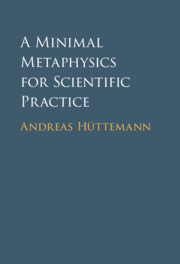Book contents
- A Minimal Metaphysics for Scientific Practice
- A Minimal Metaphysics for Scientific Practice
- Copyright page
- Contents
- Figures
- Acknowledgements
- Introduction
- Chapter 1 Laws of Nature and Their Modal Surface Structure
- Chapter 2 The Problem of Ceteris Paribus Clauses
- Chapter 3 Causation – Conceptual Groundwork
- Chapter 4 Causation – Application and Augmentation
- Chapter 5 Reductive Practices
- Chapter 6 Reduction and Physical Foundationalism
- Chapter 7 Reduction and Ontological Monism
- Chapter 8 Concluding Remarks: Methods and Epistemic Sources in Metaphysics
- Bibliography
- Index
Chapter 2 - The Problem of Ceteris Paribus Clauses
Published online by Cambridge University Press: 04 August 2021
- A Minimal Metaphysics for Scientific Practice
- A Minimal Metaphysics for Scientific Practice
- Copyright page
- Contents
- Figures
- Acknowledgements
- Introduction
- Chapter 1 Laws of Nature and Their Modal Surface Structure
- Chapter 2 The Problem of Ceteris Paribus Clauses
- Chapter 3 Causation – Conceptual Groundwork
- Chapter 4 Causation – Application and Augmentation
- Chapter 5 Reductive Practices
- Chapter 6 Reduction and Physical Foundationalism
- Chapter 7 Reduction and Ontological Monism
- Chapter 8 Concluding Remarks: Methods and Epistemic Sources in Metaphysics
- Bibliography
- Index
Summary
In Chapter 2 I examine what appears to be a violation of the invariance of laws. Generalisations typically concern the behaviour of isolated systems, while explanations, confirmations, manipulations and predictions concern non-isolated systems. Ceteris paribus clauses, which are often attached to law statements, take account of the fact that systems are typically not on their own. Systems are interacted on and interfered with by other systems – they are not invariant with respect to the behaviour of other systems. Understanding how ceteris paribus clauses work helps us to understand why we can explain, confirm or manipulate the behaviour of systems that are parts of a larger whole. Analysis of the role of these clauses shows that we need to read laws (generalisations) as attributing multi-track dispositional properties to systems. The argument relies on an analysis of scientific practice only and is not committed to more far-reaching claims that are common in the metaphysics of science literature. There is no need to assume a sui generis conception of dispositional modality. I will argue that the modal aspects of dispositions can be explicated in terms of invariance relations.
Information
- Type
- Chapter
- Information
- A Minimal Metaphysics for Scientific Practice , pp. 38 - 81Publisher: Cambridge University PressPrint publication year: 2021
